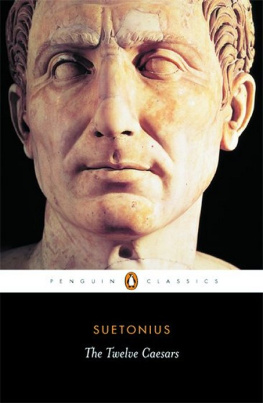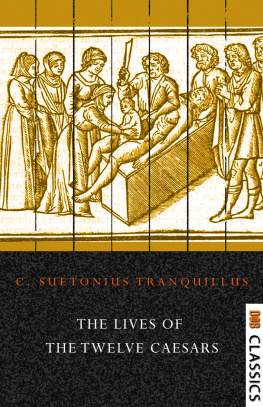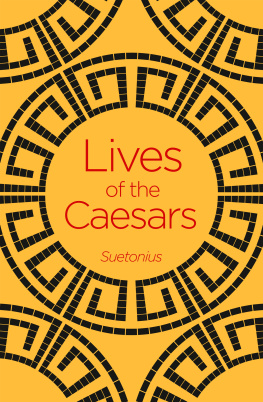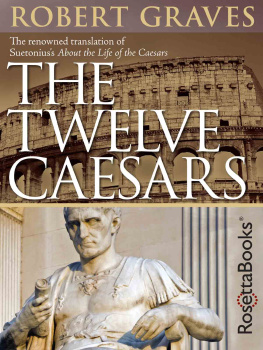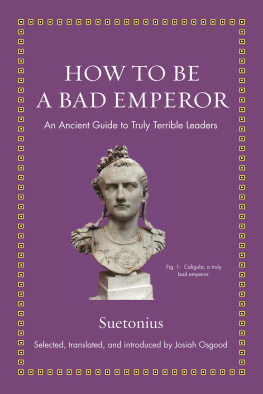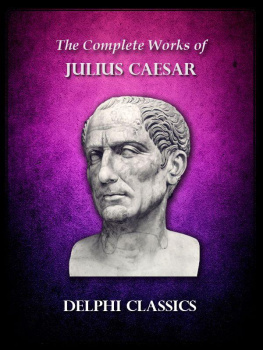Suetonius - The Twelve Caesars
Here you can read online Suetonius - The Twelve Caesars full text of the book (entire story) in english for free. Download pdf and epub, get meaning, cover and reviews about this ebook. year: 2007, publisher: Penguin Classics, genre: Science. Description of the work, (preface) as well as reviews are available. Best literature library LitArk.com created for fans of good reading and offers a wide selection of genres:
Romance novel
Science fiction
Adventure
Detective
Science
History
Home and family
Prose
Art
Politics
Computer
Non-fiction
Religion
Business
Children
Humor
Choose a favorite category and find really read worthwhile books. Enjoy immersion in the world of imagination, feel the emotions of the characters or learn something new for yourself, make an fascinating discovery.
The Twelve Caesars: summary, description and annotation
We offer to read an annotation, description, summary or preface (depends on what the author of the book "The Twelve Caesars" wrote himself). If you haven't found the necessary information about the book — write in the comments, we will try to find it.
The Twelve Caesars — read online for free the complete book (whole text) full work
Below is the text of the book, divided by pages. System saving the place of the last page read, allows you to conveniently read the book "The Twelve Caesars" online for free, without having to search again every time where you left off. Put a bookmark, and you can go to the page where you finished reading at any time.
Font size:
Interval:
Bookmark:

THE TWELVE CAESARS
GAIUS SUETONIUS TRANQUILLUS was born into a family of equestrian rank, probably in AD 70; his father had served as a military tribune under the emperor Otho. The place of his birth is unknown (possibly Hippo Regius in North Africa), but he was in Rome by the 90s. He practised as an advocate, perhaps for only a brief time, and embarked on a public career under the patronage of Pliny the Younger; he may have served on his staff when Pliny was governor of the province of Pontus and Bithynia in AD 11011. Suetonius also devoted himself to scholarship from an early age, producing a number of learned works that are now almost entirely lost; the most important of these was On Illustrious Men, a collection of over 100 brief lives of notable Roman writers, parts of which still survive. He served as imperial secretary for studies and for libraries, probably under the emperor Trajan, and as imperial secretary in charge of correspondence under the emperor Hadrian, a post from which he was dismissed in AD 122. He was at that time at work on his magnum opus, The Twelve Caesars, the only one of his works to survive virtually complete. He died perhaps sometime after the year AD 130.
The poet and novelist ROBERT GRAVES was born in 1895, the son of the poet Alfred Graves and his wife Amy, the greatniece of the historian Leopold von Ranke. He was educated at Charterhouse (190914), where he began publishing poetry. After leaving school, he served in the army during the First World War, and was severely wounded in the Battle of the Somme (1916). His first book of poetry appeared later that same year, but it was his autobiography of the war years, Goodbye to All That (1929), that first made him famous. Among the most notable of the more than 135 books that he published in his lifetime are the bestselling novels I, Claudius (1934) and Claudius the God (1935); The White Goddess (1948), an original and highly personal study of myth and poetic inspiration; and his Collected Poems (1975). He died in Majorca, his home since 1928, in 1985.
J. B. RIVES received his PhD in Classics from Stanford University (1990), and taught at Columbia University and York University in Toronto before moving to the University of North Carolina at Chapel Hill, where he is currently Kenan Eminent Professor of Classics. He is the author of Religion and Authority in Roman Carthage (1995) and Religion in the Roman Empire (2006) as well as numerous articles on aspects of religion in the Roman world; he has also published a translation, with introduction and commentary, of Tacitus Germania (1999).
GAIUS SUETONIUS TRANQUILLUS
Translated by ROBERT GRAVES
Revised with an Introduction and Notes by J. B. RIVES
PENGUIN BOOKS
PENGUIN CLASSICS
Published by the Penguin Group
Penguin Books Ltd, 80 Strand, London WC2R 0RL, England
Penguin Group (USA) Inc., 375 Hudson Street, New York, New York 10014, USA
Penguin Group (Canada), 90 Eglinton Avenue East, Suite 700, Toronto, Ontario, Canada M4P 2Y3
(a division of Pearson Penguin Canada Inc. )
Penguin Ireland, 25 St Stephen's Green, Dublin 2, Ireland
(a division of Penguin Books Ltd)
Penguin Group (Australia), 250 Camberwell Road, Camberwell, Victoria 3124, Australia
(a division of Pearson Australia Group Pty Ltd)
Penguin Books India Pvt Ltd, 11 Community Centre, Panchsheel Park, New Delhi 110 017, India
Penguin Group (NZ), 67 Apollo Drive, Rosedale, North Shore 0632, New Zealand
(a division of Pearson New Zealand Ltd)
Penguin Books (South Africa) (Pty) Ltd, 24 Sturdee Avenue, Rosebank, Johannesburg 2196, South Africa
Penguin Books Ltd, Registered Offices: 80 Strand, London WC2R 0RL, England
www.penguin.com
This translation first published 1957
This revised edition published in Penguin Classics 2007
1
Copyright 1957 by Robert Graves
Introduction, editorial matter and revisions to the translation
copyright James Rives, 2007
All rights reserved
The moral right of the editor has been asserted
Except in the United States of America, this book is sold subject to the condition that it shall not, by way of trade or otherwise, be lent, re-sold, hired out, or otherwise circulated without the publisher's prior consent in any form of binding or cover other than that in which it is published and without a similar condition including this condition being imposed on the subsequent purchaser
9780141915890
| Aug. | Divus Augustus | Nero | Nero |
| Calig. | Gaius Caligula | Otho | Otho |
| Claud. | Divus Claudius | Tib. | Tiberius |
| Dom. | Domitian | Tit. | Divus Titus |
| Galba | Galba | Vesp. | Divus Vespasian |
| Jul. | Divus Julius | Vit. | Vitellius |
ROMAN PRAENOMINA
| A. | Aulus | Mam. | Mamercus |
| Ap. | Appius | P. | Publius |
| C. | Gaius | Q. | Quintus |
| Cn. | Gnaeus | Ser. | Servius |
| D. | Decimus | Sex. | Sextus |
| L. | Lucius | T. | Titus |
| M. | Marcus | Ti. | Tiberius |
| M. | Manius |
ROMAN MAGISTRACIES
| aed. | Aedile | pr. | Praetor |
| cos. | consul | q. | quaestor |
| cos. suff. | suffect consul | tr. | tribune |
Tribunate and death of Ti. Sempronius Gracchus.
Second tribunate of C. Sempronius Gracchus; opposition of M. Livius Drusus.
112106 War with Jugurtha; C. Marius elected consul in 107 to take command of the war.
104100 Marius consul five times in a row; defeats the invading Germanic tribes of the Teutones and Cimbri in 102 and 101.
Legislation and death of L. Appuleius Saturninus. Birth of Julius Caesar.
Assassination of the younger M. Livius Drusus.
9187 Social (Marsic) War between Rome and its Italian allies.
8885 First war with Mithridates under the command of L. Cornelius Sulla; in Rome, Marius and L. Cornelius Cinna take control and kill the supporters of Sulla.
Caesar marries Cornelia.
8382 Sulla returns to Italy; civil war between partisans of Sulla and partisans of Cinna; Sulla's victory followed by proscriptions. In Asia, second war with Mithridates.
8279 Sulla dictator; Q. Sertorius begins guerrilla war in Spain, which lasts until 72.
Caesar's military service in Asia and Bithynia.
7877 Revolt of M. Aemilius Lepidus in Italy.
Caesar travels to Rhodes and is kidnapped by pirates.
7466 Third war with Mithridates.
Caesar military tribune.
Cn. Pompeius (Pompey) and L. Licinius Crassus consuls for the first time.
Caesar quaestor in Rome and Further Spain; his wife Cornelia dies.
Font size:
Interval:
Bookmark:
Similar books «The Twelve Caesars»
Look at similar books to The Twelve Caesars. We have selected literature similar in name and meaning in the hope of providing readers with more options to find new, interesting, not yet read works.
Discussion, reviews of the book The Twelve Caesars and just readers' own opinions. Leave your comments, write what you think about the work, its meaning or the main characters. Specify what exactly you liked and what you didn't like, and why you think so.

